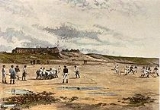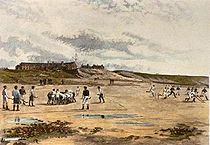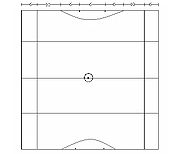
Rossall Hockey
Encyclopedia
Rossall Hockey or RossHockey is a unique form of hockey played only at Rossall School
, in Fleetwood
, on the Fylde coast
, Lancashire
, England
. The game is unique to Rossall School and is played on the beach next to the school during the Lent
term only, with the pitch being marked by dragging the hockey sticks in the sand before each match. It is a brutal beach game born of rugby
but played with hockey-like sticks by girls as well as boys at the school. It dates back to the 19th century when pitches were too wet for rugby. It is one of the few school coded sports to have remained in use despite the dominance of other national codes in modern sport. The only other examples of school coded sport in the United Kingdom
that remain are those of the various Fives
codes; of which Rossall has its own, as well as Harrow football
, Winchester College football
, the Eton wall game
and the Eton field game
.
 Rossall Hockey was referenced in the first issue of the Rossallian in 1867, though its exact date of creation is not known. Rossall Hockey started as a derivation of Rossall Football, an adaptation of the Eton field game introduced to the school in 1857 by a school master who had been a student at Eton College
Rossall Hockey was referenced in the first issue of the Rossallian in 1867, though its exact date of creation is not known. Rossall Hockey started as a derivation of Rossall Football, an adaptation of the Eton field game introduced to the school in 1857 by a school master who had been a student at Eton College
.
Initially the rules of RossHockey were slightly different from those of today, with scoring occurring by a system of goals and rougeables. It is also known that there were no restrictions on the number of players in a game and there was no fixed time of play - indeed one game lasted for two days.
The official rules were drawn up in 1873 and two years later the first House RossHockey competition took place. The rules were amended again in 1900 to abolish rougeables. Emphasis has always been placed on the game being one of skill and dribbling - as well as one of brute force.
In 1997 the game was nearly abandoned after over 130 years of history when the supplier of the sticks went bankrupt. Fortunately a replacement supplier was found in Eccles
where they had made lacrosse
sticks for many years. The new sticks are slightly less ornate than the traditional ones and also made of hickory
rather than ash
but the gameplay has not been affected.

Rossall School
Rossall School is a British, co-educational, independent school, between Cleveleys and Fleetwood, Lancashire. Rossall was founded in 1844 by St. Vincent Beechey as a sister school to Marlborough College which had been founded the previous year...
, in Fleetwood
Fleetwood
Fleetwood is a town within the Wyre district of Lancashire, England, lying at the northwest corner of the Fylde. It had a population of 26,840 people at the 2001 Census. It forms part of the Greater Blackpool conurbation. The town was the first planned community of the Victorian era...
, on the Fylde coast
The Fylde
The Fylde ; Scandinavian: "field") is a coastal plain in western Lancashire, England. It is roughly a 13-mile square-shaped peninsula, bounded by Morecambe Bay to the north, the Ribble estuary to the south, the Irish Sea to the west, and the Bowland hills to the east...
, Lancashire
Lancashire
Lancashire is a non-metropolitan county of historic origin in the North West of England. It takes its name from the city of Lancaster, and is sometimes known as the County of Lancaster. Although Lancaster is still considered to be the county town, Lancashire County Council is based in Preston...
, England
England
England is a country that is part of the United Kingdom. It shares land borders with Scotland to the north and Wales to the west; the Irish Sea is to the north west, the Celtic Sea to the south west, with the North Sea to the east and the English Channel to the south separating it from continental...
. The game is unique to Rossall School and is played on the beach next to the school during the Lent
Lent
In the Christian tradition, Lent is the period of the liturgical year from Ash Wednesday to Easter. The traditional purpose of Lent is the preparation of the believer – through prayer, repentance, almsgiving and self-denial – for the annual commemoration during Holy Week of the Death and...
term only, with the pitch being marked by dragging the hockey sticks in the sand before each match. It is a brutal beach game born of rugby
Rugby football
Rugby football is a style of football named after Rugby School in the United Kingdom. It is seen most prominently in two current sports, rugby league and rugby union.-History:...
but played with hockey-like sticks by girls as well as boys at the school. It dates back to the 19th century when pitches were too wet for rugby. It is one of the few school coded sports to have remained in use despite the dominance of other national codes in modern sport. The only other examples of school coded sport in the United Kingdom
United Kingdom
The United Kingdom of Great Britain and Northern IrelandIn the United Kingdom and Dependencies, other languages have been officially recognised as legitimate autochthonous languages under the European Charter for Regional or Minority Languages...
that remain are those of the various Fives
Fives
Fives is a British sport believed to derive from the same origins as many racquet sports. In fives, a ball is propelled against the walls of a special court using gloved or bare hands as though they were a racquet.-Background:...
codes; of which Rossall has its own, as well as Harrow football
Harrow Football
Harrow football is a code of football played between two teams of eleven players, each attempting to win by scoring more bases than their opponent. Harrow Football is played predominantly with the feet, but players may use any part of their body including, in certain circumstances, their hands and...
, Winchester College football
Winchester College Football
Winchester College Football, also known as Winkies, WinCoFo or simply "Our Game", is a code of football played at Winchester College. It is akin to the Eton Field and Wall Games and the Harrow Game in that it enjoys a large following from Wykehamists and old Wykehamists but is not played outside...
, the Eton wall game
Eton Wall Game
The Eton wall game is a game similar to football and Rugby Union, that originated from and is still played at Eton College. It is played on a strip of ground 5 metres wide and 110 metres long next to a slightly curved brick wall, erected in 1717....
and the Eton field game
Eton Field Game
The Field Game is one of two codes of football devised and played at Eton College. The other is the Eton Wall Game. The game is like football in some ways — the ball is round, but one size smaller than a standard football, and may not be handled — but the off-side rules — known as 'sneaking' — are...
.
History

Eton College
Eton College, often referred to simply as Eton, is a British independent school for boys aged 13 to 18. It was founded in 1440 by King Henry VI as "The King's College of Our Lady of Eton besides Wyndsor"....
.
Initially the rules of RossHockey were slightly different from those of today, with scoring occurring by a system of goals and rougeables. It is also known that there were no restrictions on the number of players in a game and there was no fixed time of play - indeed one game lasted for two days.
The official rules were drawn up in 1873 and two years later the first House RossHockey competition took place. The rules were amended again in 1900 to abolish rougeables. Emphasis has always been placed on the game being one of skill and dribbling - as well as one of brute force.
In 1997 the game was nearly abandoned after over 130 years of history when the supplier of the sticks went bankrupt. Fortunately a replacement supplier was found in Eccles
Eccles, Greater Manchester
Eccles is a town in the City of Salford, a metropolitan borough of Greater Manchester in North West England, west of Salford and west of Manchester city centre...
where they had made lacrosse
Lacrosse
Lacrosse is a team sport of Native American origin played using a small rubber ball and a long-handled stick called a crosse or lacrosse stick, mainly played in the United States and Canada. It is a contact sport which requires padding. The head of the lacrosse stick is strung with loose mesh...
sticks for many years. The new sticks are slightly less ornate than the traditional ones and also made of hickory
Hickory
Trees in the genus Carya are commonly known as hickory, derived from the Powhatan language of Virginia. The genus includes 17–19 species of deciduous trees with pinnately compound leaves and big nuts...
rather than ash
Ash tree
Fraxinus is a genus flowering plants in the olive and lilac family, Oleaceae. It contains 45-65 species of usually medium to large trees, mostly deciduous though a few subtropical species are evergreen. The tree's common English name, ash, goes back to the Old English æsc, while the generic name...
but the gameplay has not been affected.
Rules

| Name | Description |
|---|---|
| Free hits | If a free hit is awarded then all players must stand at least five metres from the ball. The ball may be striked with as much vigour as the player chooses. Players may halt the ball in mid air using a hand, however they must not push the ball forward using their hand otherwise a free hit to the other team may be awarded. If the ball is hit out of the side of the pitch a roll-in is given to the opposing team. If the ball is hit off the pitch at the end, outside of the "D" or inside the "D" without stick contact before it crosses the line then a "20-Bully" is observed. In free hits, only one defender is allowed to stand in the "D" whilst the rest of the players on the pitch must stand outside. |
| 20-Bully | A "20-Bully" is like any other bully but occurs on the twenty pace line. A "20-Bully" may be awarded if the ball is forced off the pitch at either end. |
| Line-Bully | A "Line-Bully" is like any other bully but occurs at the top end of the "D". A "Line-Bully" may be given if a foul is committed by the defending team in their own "D". If three "Line-Bullies" are awarded in a row a penalty stroke will be given to the attacking team. |
| Penalty stroke | A penalty stroke is like a free hit but always taken from twenty pace line. It gives the attacking team an opportunity to score from outside the "D". Both teams must stand behind the half way line except the taker of the stroke and one of the defending team who may stand behind the goal line to attempt to stop the ball from crossing the line. |
| Roll-in | A Roll-in will be awarded if the ball leaves the side of the pitch. The ball is given to a player on the team who had not hit the ball out. Meanwhile, the rest of the two teams each line up horizontally across the pitch, with the teams two metres apart. The player with the ball then has to roll the ball in. The ball must go at least six paces, as marked by a line on the pitch, but must also touch the ground before the six pace line. |
Gameplay
- The pitch should be drawn up as indicated in the diagram, with the numbers indicating measurements in paces. The pitch should also be 80 paces in length.
- The game begins with a bully at the centre circle. A bully consists of seven players from each team lined up in opposing lines. Three players from each team stand out of the bully as flies. Four sticks from each team must be placed into the centre to trap the ball.
- When the whistle is blown the match begins with each team driving forward in their lines to wrench the ball from the control of the other team.
- When the ball is freed from a bully the teams must each chase after it and force it in across the goal line between the opposing team's posts.
- If a player loses the ball by running ahead of it, another player from their team must take it on. The ball must always be approached from the rear by a player who wishes to take it on - if they fail to do so then they are considered offside.
- Scoring occurs only when the ball is pushed over the line by a player within the "D".
Fouls
Any of the following are fouls and will result in a free hit except if they are committed in the "D" by the defending team, in which case a Line-Bully is observed:| Name | Description |
|---|---|
| Out of control ball | This is considered to be a situation where the ball is pushed more than three metres in front of the person who hit the ball. |
| Dangerous play | This can consist of any number of offences including the throwing of one's stick at another person, the hacking of the ball with malicious intent or holding one's stick above head-height. |
| Using the incorrect side of the stick | A stick may not be inverted in order to touch the ball. |
| Turning with the ball | When a player takes the ball they must not take it with their back against the direction which they are playing. Similarly they may not pirouette whilst dribbling. |
| Tackling from the wrong side | A player must attempt to tackle the player with the ball by approaching them from the opposite direction to which they are running. Tackling from the side is not permitted. |
| Offside | In order to take control of the ball a player must have his body behind it. If this is not observed then they are deemed to have taken the ball on from an offside position. If a player loses control of the ball by allowing it to fall behind their stick then they may not touch the ball with the stick until another player on the pitch has done so from an appropriate position. |
| Passing the Ball | The ball must never be passed forward, even as an accident, except in the instance of a free hit. |

